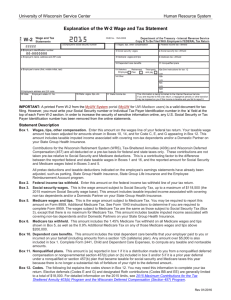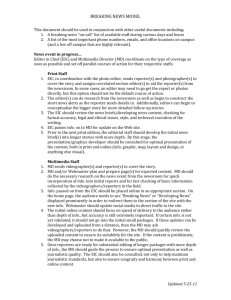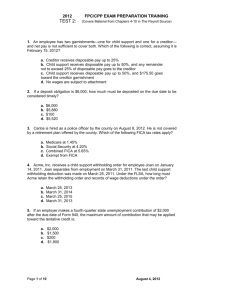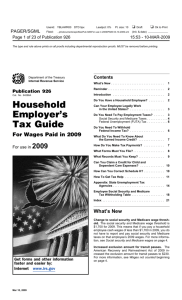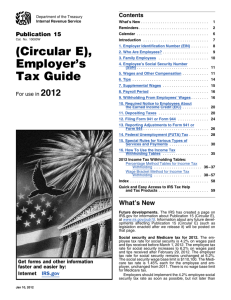From Larry Borton, MSU Telfarm, MSUE
advertisement
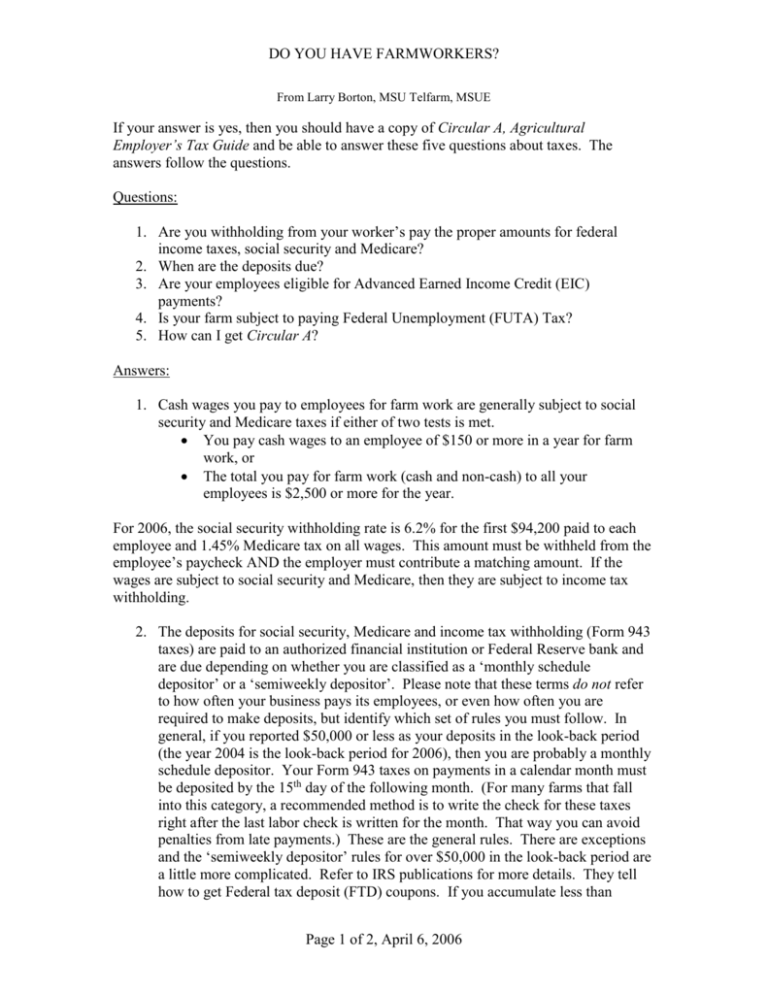
DO YOU HAVE FARMWORKERS? From Larry Borton, MSU Telfarm, MSUE If your answer is yes, then you should have a copy of Circular A, Agricultural Employer’s Tax Guide and be able to answer these five questions about taxes. The answers follow the questions. Questions: 1. Are you withholding from your worker’s pay the proper amounts for federal income taxes, social security and Medicare? 2. When are the deposits due? 3. Are your employees eligible for Advanced Earned Income Credit (EIC) payments? 4. Is your farm subject to paying Federal Unemployment (FUTA) Tax? 5. How can I get Circular A? Answers: 1. Cash wages you pay to employees for farm work are generally subject to social security and Medicare taxes if either of two tests is met. You pay cash wages to an employee of $150 or more in a year for farm work, or The total you pay for farm work (cash and non-cash) to all your employees is $2,500 or more for the year. For 2006, the social security withholding rate is 6.2% for the first $94,200 paid to each employee and 1.45% Medicare tax on all wages. This amount must be withheld from the employee’s paycheck AND the employer must contribute a matching amount. If the wages are subject to social security and Medicare, then they are subject to income tax withholding. 2. The deposits for social security, Medicare and income tax withholding (Form 943 taxes) are paid to an authorized financial institution or Federal Reserve bank and are due depending on whether you are classified as a ‘monthly schedule depositor’ or a ‘semiweekly depositor’. Please note that these terms do not refer to how often your business pays its employees, or even how often you are required to make deposits, but identify which set of rules you must follow. In general, if you reported $50,000 or less as your deposits in the look-back period (the year 2004 is the look-back period for 2006), then you are probably a monthly schedule depositor. Your Form 943 taxes on payments in a calendar month must be deposited by the 15th day of the following month. (For many farms that fall into this category, a recommended method is to write the check for these taxes right after the last labor check is written for the month. That way you can avoid penalties from late payments.) These are the general rules. There are exceptions and the ‘semiweekly depositor’ rules for over $50,000 in the look-back period are a little more complicated. Refer to IRS publications for more details. They tell how to get Federal tax deposit (FTD) coupons. If you accumulate less than Page 1 of 2, April 6, 2006 DO YOU HAVE FARMWORKERS? $2,500 of net Form 943 taxes after paying an advance EIC payment, no deposits are required and you can pay in full with the Form 943 filed on time. 3. An employee who is eligible for the earned income credit (EIC) and who has a qualifying child, is entitled to receive EIC payments with his or her pay during the year. Generally, the employer makes the advance EIC payment from withheld income tax and employee and employer social security and Medicare taxes. Employers are required to notify employees who have no income tax withheld that they may be able to claim a tax refund because of EIC. During 2006, if you pay an employee total wages of at least $32,001 ($34,001 if filing jointly), you must stop making advance EIC payment to that employee for the rest of the year. 4. FUTA provides for payments of unemployment compensation to workers who have lost their jobs. Employers who meet either one of the following two tests, probably have to pay FUTA. Paid cash wages of $20,000 or more to farm workers in any calendar quarter in 2004 or 2005. Employed 10 of more farm workers during at least some part of a day (whether or not at the same time) during any 20 or more different weeks in 2004 or 20 or more different weeks in 2005. There are exceptions for some family members and certain payments for agricultural workers. The FUTA tax rate is 6.2% on the first $7,000 of cash wages you pay each employee and is generally deposited quarterly. You may receive a credit of 5.4% of FUTA wages for the state unemployment tax you pay. Generally, services or wages subject to the federal FUTA laws are also subject to the Michigan unemployment insurance laws with a few exceptions. 5. These answers come from IRS publications. To remain in compliance and avoid problems and penalties, every farm operation that employs workers should have a copy of IRS Publication 51, Circular A, Agricultural Employer’s Tax Guide. You can order it anytime through the IRS Web Site, www.irs.gov or over the telephone (1-800-829-3676). Page 2 of 2, April 6, 2006


